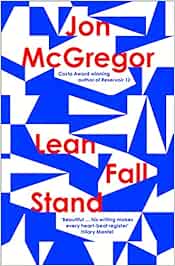4 Stars
The first section of the book (entitled “Lean”) begins in Antarctica where Robert (Doc) Wright is serving as general technical assistant to two young researchers. An expedition to take photos ends in tragedy. The second section (entitled “Fall”) focuses on Anna, Robert’s wife, who becomes his primary caregiver as he struggles to recover from a stroke. The final section (entitled “Stand”) centres on an aphasia support group where people are encouraged to explore different methods of communication in order to tell their stories.
Though the three parts might seem to belong to three different genres, they can all be called survival stories connected by the theme of communication. In the Antarctica chapter, there is a lot of miscommunication and broken communication because the men hear only snatches of each other’s voices on their radios. Then Robert’s ability to talk is compromised. In “Fall” Robert is unable to communicate easily, and Anna is given incomplete information about Robert’s condition and treatment. In “Stand” we encounter people who are experiencing different types of aphasia and learning other ways of expressing themselves, including non-verbal communication.
Isolation is also an important element in the three sections. By virtue of their remote location, the Antarctica team is isolated from the outside world, and events cause the three of them to become physically isolated from each other. Anna and Robert, accustomed to living apart, are brought together but remain emotionally isolated and struggle to connect. Everyone in the support group feels isolated because of difficulties communicating with others.
Readers will probably like different sections of the novel for various reasons, but I found something to admire in all parts. “Lean” is an adventure story with lots of action and suspense. It ends with Robert’s stream-of-consciousness which so realistically reflects his fragmented and confused thinking. What is outstanding in “Fall” is not just Robert’s struggle to adapt to his circumstances but also the impact his situation has on others, especially Anna. “Stand” for me was the weakest, but it depicts various types of aphasia and offers hope in showing people adapting to a new way of functioning in the world.
I enjoyed the characterization of Robert and Anna. Robert is a 30-year veteran of expeditions to Antarctica. He enjoys the “pure cold blessing of silence” to be found on the southernmost continent, though he spends evenings entertaining the men with “detailed stories about his early seasons at Station K.” And when he’s home, he talks so much that Anna one time tells him, “Shut the shit up!” This is the man who finds himself in a position where he has lost the ability to tell his stories and “always had to reach for the words. As though they’d been put on a high shelf in the stores. Out of reach. Or left outside, snowed under, needing to be dug out.” The traits he needed to survive in the challenging conditions of Antarctica, he has to apply to the challenges of his new life. In the opening, he serves to provide perspective to a photo, his size illuminating the scope of Antarctica’s vastness. In the end, he serves to provide a focus on both the enormity of recovery and the immense possibilities.
Like Robert, Anna also enjoys silence; she likes time alone in her garden and attends meetings of the Society of Friends which are held in silence. Then she is faced with caring for a man who struggles to speak. Her life is totally upended when Robert comes home. She is independent and self-sufficient and has become accustomed to living apart from her husband as he spent months of each of the last 30 years in Antarctica. She is a climate change scientist, but her career has to be put on hold so she can care for her husband. She admits to a friend that, “’I don’t know if I want him to come home’” and “’I don’t want to be a carer; I never really wanted to be a wife.’” We see her exhaustion as she helps Robert’s rehabilitation, with little help from social services or their self-absorbed children. She experiences a gamut of emotions: resentment, anger, and frustration.
There is much to unravel in a McGregor novel; his style is sparse, but every word is significant. If unconventional, thought-provoking literary fiction is what you enjoy, this book should be on your to-be-read pile.
Note: I received a digital galley from the publisher via NetGalley.

No comments:
Post a Comment